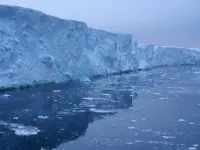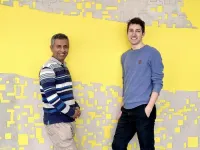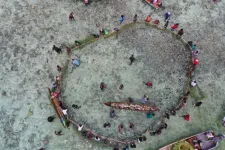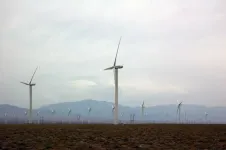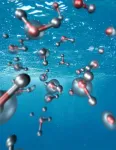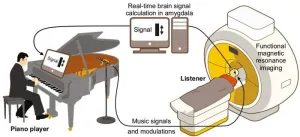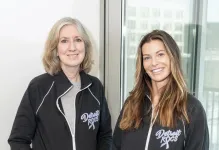(Press-News.org) Dr Weliton Menário Costa, a PhD graduate from The Australian National University (ANU), has been announced the overall winner of the 2024 global Dance Your PhD contest after wowing judges with his wickedly creative and quirky dance submission, ‘Kangaroo Time (Club Edit)’.
One of the world's leading researchers in kangaroo behaviour, he is the first person from ANU to win the Dance Your PhD competition, and just the fourth person from an Australian institution to do so since its inception in 2008.
Better known as ‘WELI’, the singer-songwriter, creator and biologist weaves together a funky beat, original songwriting, drag queens and Brazilian funk dancers to create something that’s both entertaining and educational; the final product is something that looks like it’s been plucked straight out of The Adventures of Priscilla, Queen of the Desert.
WELI stars in and directs the music video, which draws on his Brazilian roots to illustrate the distinct and varying personality traits of kangaroos using the powerful mediums of song and dance. The original and club mixes have been played more than 7,000 times on Spotify, and the song has already featured in clubs, festivals, dance classes and radio stations.
“Winning this contest is the equivalent of winning Eurovision for me. I think it not only shows the incredible might of the research conducted here in Australia, but also how creative we are as a nation. Even us scientists!” he said.
Reflecting on the success of ‘Kangaroo Time’ and the global mark it’s made on the scientific community and further afield, WELI notes that at the core of his video is a message of inclusivity and diversity – something he hopes will be one of the main takeaways that viewers hold onto.
“As a queer immigrant from a linguistically diverse developing country, I understand the challenges of feeling disconnected in certain environments,” he said.
“One of the main messages I wanted to convey through this piece of work is that differences lead to diversity, and this is evident throughout the entire video. It’s evident with the different dancers that herald from various cultures and backgrounds.
“I think it’s extremely important that we celebrate diversity and creating a video explaining kangaroo personality was an excellent medium for me to do this.”
In 2017, WELI relocated from his home country of Brazil to Canberra to undertake a PhD in animal behaviour at the ANU Research School of Biology, which he finished in 2021.
Armed with a remote-controlled car, the ANU graduate spent more than three years studying the spectrum of behavioural differences of a group of more than 300 wild eastern grey kangaroos in Victoria.
“We found that kangaroos like to socialise in groups but prefer smaller social circles. Like humans, kangaroo personalities manifest early in life. Mothers and their offspring have similar personalities, and so do siblings,” he said.
“Kangaroos are very socially aware and will adjust their behaviour based off cues from other roos.
“The diversity of the dancers, from classical ballet to twerking, and the urban street dancers to the Brazilian dancing styles, reflect the variations in kangaroo personality across the full spectrum, from bolder types to shier roos.”
On the surface, ‘Kangaroo Time’ is an effective display of science communication that expertly utilises the creative arts medium. It’s engaging, quirky and niche. But WELI admits the decision to incorporate the words kangaroo time into the video’s title acts as a double entendre of sorts.
“The use of kangaroo time is not just to explain my research studying kangaroo personality – it’s also about my time living and studying in Australia as a whole,” he said.
“It’s been a time of exploration for me, a time where I’ve been able to reconnect with and grow my passion for music, dance and the creative arts.
“Working on this project was the spark I needed to encourage me to take that next step with my music. It’s made me realise I want to focus on my music for the next little while and put my scientific career on the backburner.
“Speaking of which, I’m about to release a new EP called ‘Yours Academically, Dr WELI’!”
WELI will continue working at ANU as a Visiting Fellow until early 2025.
The Dance Your PhD contest challenges researchers from across the globe to explain their PhD in a simple, effective and engaging way – bridging the gap between the scientific community and the general public.
Check out ‘Kangaroo Time (Club Edit)’ on WELI’s YouTube channel. You can read more about WELI’s journey from kangaroo whisperer to global dance sensation at ANU Reporter.
IMAGES AVAILABLE HERE.
END
Australian researcher's journey from kangaroo whisperer to global dance sensation
2024-02-26
ELSE PRESS RELEASES FROM THIS DATE:
Black carbon sensor could fill massive monitoring gaps
2024-02-26
Black carbon is the most dangerous air pollutant you’ve never heard of. Its two main sources, diesel exhaust and wood smoke from wildfires and household heating, produce ultrafine air particles that are up to 25 times more of a health hazard per unit compared to other types of particulate matter. Despite its danger, black carbon is understudied due to a lack of monitoring equipment. Regulatory-standard sensors are wildly expensive to deploy and maintain, resulting in sparse coverage in regions infamous for poor air quality, such as the greater Salt Lake City metropolitan area in Utah.
A University of Utah-led study found that the AethLabs ...
UC Irvine advances stem cell research with $4 million CIRM grant for shared resources lab
2024-02-26
Irvine, Calif., Feb. 26, 2024 — The University of California, Irvine has received a five-year, $4 million grant from the California Institute for Regenerative Medicine to establish a shared resources lab in the Sue & Bill Gross Stem Cell Research Center. The facility will offer essential technologies and training for the development of novel in vitro stem cell-based modeling that will serve researchers across the campus and the state.
“Stem cells possess the potential to transform into particular cell types, offering promising avenues for rejuvenating and restoring tissues harmed by injury or affected ...
New discovery suggests significant glacial retreat in West Antarctica began in 1940s
2024-02-26
Among the vast expanse of Antarctica lies the Thwaites Glacier, the world’s widest glacier measuring about 80 miles on the western edge of the continent. Despite its size, the massive landform is losing about 50 billion tons of ice more than it is receiving in snowfall, which places it in a precarious position in respect to its stability.
Accelerating ice loss has been observed since the 1970s, but it is unclear when this significant melting initiated – until now. A new study published in the journal PNAS, led by researchers ...
Butterflies mimic each other’s flight behaviour to avoid predators
2024-02-26
Researchers have shown that inedible species of butterfly that mimic each others’ colour patterns have also evolved similar flight behaviours to warn predators and avoid being eaten.
It is well known that many inedible species of butterfly have evolved near identical colour patterns, which act as warning signals to predators so the butterflies avoid being eaten.
Researchers have now shown that these butterflies have not only evolved similar colour patterns, but that they have also evolved similar ...
What math tells us about social dilemmas
2024-02-26
Human coexistence depends on cooperation. Individuals have different motivations and reasons to collaborate, resulting in social dilemmas, such as the well-known prisoner's dilemma. Scientists from the Chatterjee group at the Institute of Science and Technology Austria (ISTA) now present a new mathematical principle that helps to understand the cooperation of individuals with different characteristics. The results, published in PNAS, can be applied to economics or behavioral studies.
A group of neighbors shares a driveway. Following a heavy snowstorm, the entire driveway is covered in snow, requiring clearance for daily activities. ...
Protecting fish doesn’t have to mean neglecting people, study concludes
2024-02-26
BEAUFORT, N.C. –With fish stocks declining globally, more than 190 countries recently made a commitment to protect about a third of the world’s oceans within “Marine Protected Areas,” or MPAs by the year 2030. But these designated areas of the ocean where fishing is either regulated or outright banned can come at a huge cost to some coastal communities, according to a new analysis.
To help prepare for the expansion of MPAs, an international team of researchers from Duke University, Florida State ...
What will it take for China to reach carbon neutrality by 2060?
2024-02-26
To become carbon neutral by 2060, as mandated by President Xi Jinping, China will have to build eight to 10 times more wind and solar power installations than existed in 2022. Reaching carbon neutrality will also require major construction of transmission lines.
China land use policies will also have to be more coordinated and focused on a nation-wide scale rather than be left to ad hoc decisions by local governments. That’s because 80% of solar power and 55% of wind power will have to be built within 100 miles of major population centers.
These are the conclusions of a new study from ...
A new theoretical development clarifies water's electronic structure
2024-02-26
There is no doubt that water is significant. Without it, life would never have begun, let alone continue today – not to mention its role in the environment itself, with oceans covering over 70% of Earth.
But despite its ubiquity, liquid water features some electronic intricacies that have long puzzled scientists in chemistry, physics, and technology. For example, the electron affinity, i.e. the energy stabilization undergone by a free electron when captured by water, has remained poorly characterized from an experimental ...
Live music emotionally moves us more than streamed music
2024-02-26
How does listening to live music affect the emotional center of our brain? A study carried out at the University of Zurich has found that live performances trigger a stronger emotional response than listening to music from a device. Concerts connect performers with their audience, which may also have to with evolutionary factors.
Music can have a strong effect on our emotions. Studies have shown that listening to recorded music stimulates emotional and imaginative processes in our brain. But what happens when we listen to music in a live setting, for example at a music festival, at the opera or a folk concert? ...
Detroit research team to develop novel strategies to identify genetic contributions to cancer risk and overcome barriers to genetic testing for African Americans
2024-02-26
DETROIT – A team of researchers from Wayne State University and the Barbara Ann Karmanos Cancer Institute has received a five-year, $9.6 million grant from the National Cancer Institute of the National Institutes of Health for the study “Genetic Variation in Cancer Risk and Outcomes in African Americans.” This is a Program Project Grant that includes three large studies. The team will work to improve the identification and clinical management of hereditary and multiple primary cancers in African Americans, a population that is currently underrepresented in genetic research.
According to Ann Schwartz, Ph.D., principal investigator of the project, professor and ...


